- Magnifying tools are a must-have if you want to know when to harvest marijuana. The good thing is you probably already have some of these around before you start growing marijuana. Here are the most popular ones:
- Jeweler’s loupe: this is one of the oldest tools used for this purpose and is therefore cheap and requires fewer technical skills. It is small and easy to carry around. Most jewelers’ loupes have 10X magnification, which is good enough for observing when to harvest weed. However, if you do not have sharp eyes, get a higher magnification.
- Handheld Magnifying Glass: at the risk of looking like a scientist from back in the day, get a handheld magnifier. It is better than a jeweler’s loupe, but carrying around and observing a plant is exhausting. Please familiarize yourself with how to use it before you attempt to gauge the maturity of your plant.
- Phone camera: almost everyone has a phone with a camera fitted with zooming capabilities. The better the resolution of your camera, the more accurate your observation. All you need to do when using your phone’s camera as a magnifying tool is to take a lot of pictures when the light is at its best. Go through the pictures afterward, zooming in on the different parts of your plant to see if any changes indicate maturity.
- Digital microscope: not only are they used by modern scientists, but weed growers can also use them! A digital microscope is the best tool for observing the maturity of your marijuana plant. It provides good lighting and excellent magnification and allows for storing images. This way, you can take pictures of your plant at different stages and compare how it looks as it matures. A digital microscope is more expensive than the other methods mentioned in this list and will need you to invest in a laptop (if you do not have one), but the payoff is worth it.
marijuana growing
Boost Your Autoflowers with the Best Organic Fertilizers
Published
7 months agoon
By
admin
If you are considering increasing your yield with fertilizers, you have many decisions to make. It starts with selecting one of the two principal types of cannabis fertilizers –synthetic or organic. You also need to understand the nutrients needed at different stages of cannabis growth. With this information, you can easily select the best fertilizer that fits your growing operation.
Fertilizer application for autoflowers
Auto-flowering strains are developed from the Cannabis ruderalis genetics. Cannabis strains with the auto-flowering trait depend on time and age to transition into the flowering stage. This means these plants automatically transition from the germination stage to flowering without the need for light cycle modifications. Since flowering is automatic, you would expect that these cannabis plants complete their growth cycle within a short window. However, within this period, they also rapidly absorb nutrients from the soil. These nutrients are needed for rapid cellular rearrangement, root system development, bud formations, and stem growth.
The nutrient absorption rate is high, and the plant can quickly exhaust the soil’s deposit of nutrients. This frequently happens in regions where the soil is practically poor in Nitrogen, potassium, and phosphorus. Autoflowering cannabis seeds, in many cases, need fertilizers to complete their growth cycle. Experienced cannabis farmers always have their preferred fertilizers handy as the plants start growing. In this review, we have compiled a list of the best organic fertilizers you should consider.
Why should you use organic fertilizers for autoflowers?
Both synthetic (commercially available) and organic (homemade) fertilizers are suitable for autoflowers. However, there are many reasons why you would want to consider using an organic fertilizer. Though not exclusive, here are some of the reasons to consider organic fertilizers;
1. Organic fertilizers are cheap on sale
If you are just starting on planting your first few stands of auto-flowers, you don’t want to overstretch your budget. Using organic fertilizers might help you spend less. Compared to synthetic fertilizers, the production cost for organic fertilizers is lower. The raw materials needed can be easily sourced from the environment. If you have the necessary skills, you can make these fertilizers right at home and apply them at no cost whatsoever.
2. Easily customizable
You can easily customize the nutrient content of your organic fertilizer. Synthetic fertilizers are sold in a fixed NPK ratio. Once produced, these fertilizers can only supply the component nutrients in a fixed ratio. For organic fertilizers, if you know which component supplies which nutrient, you can easily prepare fertilizer with different nutrient ratios.
3. No environmental and health hazards
Perhaps this is one of the biggest reasons many cannabis farmers prefer organic fertilizers for auto-flowers. The raw material is biodegradable, constituting no huge hazard to the environment. Since they also contain no synthetic chemicals, organic fertilizers constitute no serious health hazard. You can safely apply them without worries about getting a chemical reaction.
4. No adverse effect on harvest
You can be sure that your harvest is safe with organic fertilizers. Some synthetic fertilizers can interfere with the taste, flavor, and odor of cannabis plants. This is because residual chemicals present in these formulations can be absorbed directly into the plant’s system. With organic fertilizers, the formulation contains no residual chemicals as they are made from natural components. Your cannabis harvest is safe with its desirable features carefully preserved.
Our selection of the best organic fertilizers for auto-flowers
1. Organic superSoil
Getting it right with organic fertilizers all starts with the soil. The organic soil recipe –commonly described as ‘Supersoil’ –is one of the widely used organic growth mediums for auto-flowers. The soil is enriched with organic raw materials that are gradually decomposed over the years. The nutrients are decomposed over time into a form that the plant can easily absorb. There are various recipes and steps for mixing a SuperSoil. However, the components are always almost the same. You can modify the quantity of each component depending on the nutrient profile you need from the soil. One of the widely adopted mix ratios for autoflowers is the Ballpark recipe. Check the recipe below;
50% peat- or sphagnum-based soilless mix (provides the bulk of the medium)
10-20% mature compost (some organic nutrients + lots of microbes)
10% earthworm castings, or vermicompost (the same)
10% perlite (helps saturate the medium with O2, which is necessary for roots)
fungi/mycorrhizae/bacteria (turn raw organics into available plant food)
The fungi/mycorrhizae/bacteria component is very important. This organism plays two principal roles in Supersoils –they help decompose other components and also help the auto-flowers absorb these nutrients by binding to the plant root.
2. Bat guano
Bat poo, commonly called ‘Bat Guano,’ is a conventional organic fertilizer used in many planting operations. For thousands of years, local farmers with no access to synthetic fertilizers reportedly used bat guano. Since it works, this organic fertilizer option has survived many years of history. Today, rural farmers still use it as organically sourced fertilizer. Cannabis farmers also use Bat Guano as an organic source of Nitrogen, Phosphorus, and potassium. You can prepare bat guano in powder form or as a pre-made extract in the form of aerated tea.
Depending on the diet of the bat and its location, Bat Guano preparation can have a rich supply of both macro-and micronutrients needed by autoflowers.On harvesting the dried guano, you mix it into compost or apply it directly to the growth medium. Its rich deposit of phosphorus particularly makes it a preferred booster during the blooming period. Depending on the lay of your farm and the prevailing weather conditions, you can be creative with how you use Bat guano.
3. Manure
Manure can also serve as the right organic fertilizer for your autoflower. Primary manures are decomposed animal waste gathered from farms. Farmers who cultivate their cannabis in regions where livestock farming is a big deal prefer manual as an organic fertilizer. Since it can be readily sourced, the cost of production is very cheap. Manure offers a balanced nutrient profile for autoflowers. It also conditions the soil, making it a natural depot of plant nutrients. This deposit of nutrients makes it possible to grow autoflowers multiple times within the same cannabis planting season. For locally collected manures, composting is very important to make sure the manure does not damage the plant. Some of the most commonly prepared manure for autoflowers include;
- Chicken Manure: Manure sourced from chicken waste is high in Nitrogen. This makes a perfect option for autoflowers during the vegetative stage. Chicken manure also provides a lasting nutrient supply beyond the vegetative stage. Proper composting is needed.
- Sheep and Rabit manure: This manure is especially good for cannabis plants in the flowering stage. Although not often found in abundance, cheap rabbit manure comes naturally in an easy-to-apply pellet form.
- Composted Horses or Steers Manure: Unlike others, horses’ compost manure is produced as a cool material. This makes it easier to apply without burning the plant. They also produce a rich nutrient profile and contain beneficial organisms that can help autoflowers grow rapidly.
4. Compost tea
Though not very common, compost tea is another organic fertilizer you can consider for your autoflowers. This liquid concentrate contains soluble nutrients and microorganisms from compost materials. The key ingredients needed to make a compost team include compost. Worm casting, fish hydrolases, kelp, and molasses. The compost should have a large population of beneficial microorganisms. The worm castings are byproducts expelled from worms after digestion is completed. Kelp and molasses serve as food for fungi and bacteria that grow while the tea is brewing.
Once ready, the tea can be diluted and applied directly to the roots or sprayed on the autoflower leaves. Do not apply compost tea over an irrigation line to avoid clogging. It is also important that you apply a potent dose to a few autoflowers first and check for any adverse effects on the leaves after a few hours.
Bottom line
Growing your autoflowers with organic fertilizers is a good method of improving plant yield. The raw material needed for most organic fertilizers is locally available. You save time, energy, and resources if you choose organic fertilizers. You might also require the help of a botanist or agrochemical expert to help with any additional materials you might need. Buy autoflowering weed seeds here, great quality straight from Amsterdam
You may like
-


Dutch police find gnome made of MDMA during drug bust
-


Rejected applicants sue Minnesota over marijuana social equity licensing process
-


4 Ways Marijuana Can Help You Have A Better Thanksgiving
-


Can Big Alcohol Help The Cannabis Industry
-


California Appeals Court Rejects Marijuana Grow Permit, Citing Federal Illegality
-
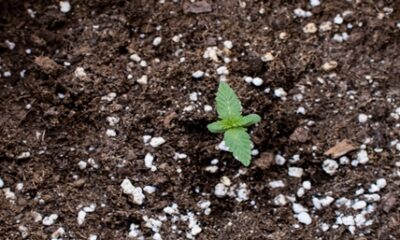

Expert Lighting Tips For Successful Indoor Growing Weed
Cannabis FAQ
Expert Lighting Tips For Successful Indoor Growing Weed
Published
21 hours agoon
November 22, 2024By
admin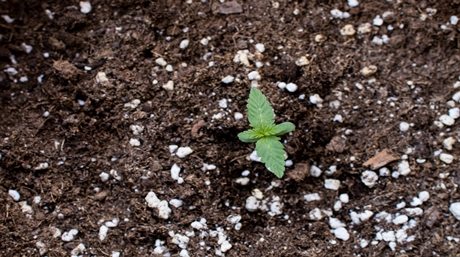
Cultivating Your Green Haven Year-Round
As the cold weather approaches and outdoor growers retreat indoors to continue their cultivation throughout the winter, the importance of choosing the right lighting for indoor growing becomes paramount. With a myriad of illumination options available, it’s easy to feel overwhelmed. But fear not, for we are here to guide you through the process, helping you create a thriving indoor garden that will yield bountiful results throughout the year.

Illuminate the Path to Successful Indoor Growing Weed
When it comes to indoor cultivation, lighting is undeniably one of the most crucial factors to consider. Not only does lighting play a vital role in manipulating the natural light cycles of marijuana plants, but it also serves as, the catalyst for photosynthesis—the process by which plants create their own, nourishment. Within the leaves of cannabis plants, chlorophyll acts as a light-absorbing pigment, harnessing light energy to convert water and carbon dioxide into food sugar.
The process of photosynthesis is directly influenced by the color, duration, and intensity of light received by the plant. By strategically altering these factors, you have the power to impact your plant’s food production. Cool blue and warm orange are examples of illumination colors that enhance a plant’s ability to generate sustenance. During the summer months, cool light is most beneficial, promoting dense and well-shaped growth. In contrast, warm-colored light during the fall harvest months induces the development of vibrant flowers. In essence, cool colors stimulate growth, while warm colors act as catalysts for flowering.
Embracing Darkness: The Role of Light Cycles
Beyond light color, the duration of light exposure your cannabis plant receives is of utmost importance. By adhering to specific light cycles, you can ensure optimal growth and flowering. During the growth phase, it is recommended to provide your young plants with 18 hours of light and 6 hours of uninterrupted darkness. This extended period of light exposure fuels vigorous vegetative growth. However, once the plant is ready to flower, adjusting the light cycle to 12 hours of light and 12 hours of darkness triggers the flowering process.
The flexibility of indoor cultivation allows you to customize the light cycle based on your preferences and the needs of your plants. This is especially beneficial during the winter months when maintaining a consistent temperature is challenging. By utilizing the ability to leave the lights on during the night and off during the day, you can create a more stable environment, minimizing temperature fluctuations and providing a nurturing space for your plants.
Choosing the Right Lamps: Illuminating Your Indoor Oasis
Selecting the appropriate lamps for your indoor grow room requires careful consideration of various factors. Firstly, assess the amount of light intensity required for your plants’ growth stage. Secondly, consider the size of your grow room, as this will determine the number and placement of lamps needed. It is essential to evaluate the electrical capabilities of the room to ensure that the chosen lamps can be adequately powered. Additionally, contemplate the preferred light color that aligns with the specific growth stage and desired outcomes. Lastly, establish a budget and compare the prices of different illumination options, keeping in mind that lighting systems are long-term investments that can incur higher costs due to their power consumption.
Fluorescent lamps with a broad color spectrum are particularly beneficial for seedlings that have not yet developed large leaves. These lamps provide ample light and support the initial stages of growth.
Indoor growers seeking maximum intensity per watt would benefit from high-pressure sodium lamps (HPS). Known for their efficiency and cost-effectiveness, HPS lamps emit a warm orange glow, which triggers plant hormones that facilitate bud development and flowering. While HPS lamps excel at providing warm light, they are less proficient in emitting cool blue light. Consequently, they are best suited for the flowering stage of growth. If you were to use an HPS bulb for seedlings, it is advisable to keep the lamps at a lower height (approximately 80 cm/31.50 inches) to encourage rapid horizontal growth. Early pruning can also help control plant height and prevent excessive stretching.
On the other hand, metal halide lamps (MH) are highly efficient and serve as an excellent primary light source for indoor growers. Emitting one of the brightest cool lights available, MH lamps are ideal for promoting foliage growth and cultivating robust plants. With an average lifespan of 10,000 hours, MH lamps retain their glow for an extended period. However, it is important to note that over time, the energy they emit within the blue range diminishes. Therefore, regular assessment and potential replacement of MH lamps are necessary to maintain optimal illumination conditions.
Expert Tips for Successful Indoor Growing Weed
To ensure the success of your indoor cultivation journey, consider the following tips:
- Maintain Adequate Distance: Pay close attention to the proximity of your plants to the light source. If the lamps are too close, they may cause light burn and damage your precious foliage. Strive to maintain a safe distance between the lamps and plants to avoid such undesirable outcomes.
- Achieve Balance: Provide all your plants with a consistent and equal amount of light. Avoid overcrowding, as taller plants may overshadow their smaller counterparts, depriving them of much-needed light. To overcome this challenge, consider using bins or adjustable platforms to elevate smaller plants closer to the light source, ensuring equitable light distribution.
- Cultivate a Year-Round Bliss: Embrace the advantages of indoor cultivation, relishing a year-round supply of your favorite buds. Although setting up your indoor oasis may seem initially daunting, the rewards will be reaped one bud at a time. With careful attention to illumination, you can create an optimal environment for your plants to thrive regardless of the season.
In conclusion, selecting the ideal illumination system for indoor growing is a decision that warrants thoughtful consideration. By understanding the profound impact of light color, cycle duration, and intensity on your plants, you can make informed choices that maximize yield potential. Whether you opt for fluorescent lamps, high-pressure sodium lamps (HPS), or metal halide lamps (MH), remember to strike a balance and provide optimal conditions for your plants to thrive. Embrace the joys of indoor cultivation and revel in the delights of a bountiful harvest, regardless of the season.
Cannabis FAQ
Harvesting Marijuana, How And When, Expert Breeder Guide
Published
1 month agoon
October 15, 2024By
admin
Table of contents
When can I harvest marijuana?
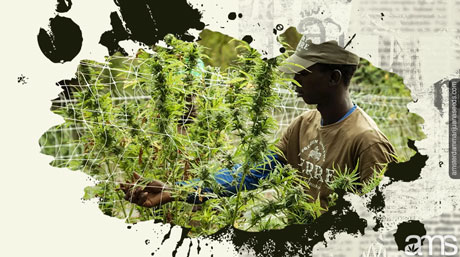
We are glad that you are here with us and have been growing cannabis. Now want to know when is the right time to harvest cannabis. The moment to reap what you have sown, the reward of your hard work, a labor of love, we hope.
Cannabis cultivation is not just watering cannabis plants. Many factors influence the growth and development of your plants. Luckily your experience and familiarity with the cannabis plants will grow too. I know a couple of master growers who have developed a sixth sense for the plant. They can almost predict the future while looking at a fan leaf and know the optimal harvest time to a tee creating the most gorgeous and powerful buds. (#lifegoals)
So keeping a close eye on your cannabis plants and knowing what to look for can make all the difference in determining the right time to harvest!
Monitor the entire plant and check the lower buds. Are they not too low, so they don’t get wet from the irrigation system? Learn to read the leaves and check the underside, as some monsters hide under the fan leaves. If you care for your cannabis plant, check in daily or once in a few days to develop a routine that you can follow to the letter. This will give you an overview to see if something is off and where / what to look. Practice makes perfect!
Don’t be afraid to investigate further; if something is off but can’t find it straight away, cut up a large fan leaf to inspect it thoroughly. Like the buds, you can sample buds to look for evidence of insects, mold, or bud rot. Better safe than sorry; if you catch a “plague” on time, you can control the damage to just a few plants, Saving your harvest!
The naked eye is not always good enough for a good inspection. So get a nice magnifying glass, and while you are at it, a lab coat too. You will not only see more but look very professional while doing so.
When is the best time to harvest cannabis plants?
The answer may vary depending on who you ask, but most experts agree that the ideal time to harvest is when 50-70% of the cannabis trichomes are ready.
What do trichomes look like when ready to harvest?
Some mature trichomes are completely yellow; a few can remain milky white, while others have amber trichomes. You must wait until 70% of the clear trichomes have turned into solid amber trichomes to obtain higher amounts of CBD & THC. It’s the time when many growers harvest their cannabis plants.
The curing process
The curing stage of the harvested cannabis plant is an art form that growers have perfected over the years. The goal of curing is to preserve the potency and flavor of the buds while reducing the risk of mold or pest infestation.
The most important step in drying cannabis is carefully controlling humidity and temperature levels. If the buds are too dry, they will lose their potency and flavor. They will be susceptible to mold and pests if they are too moist. The ideal relative humidity for curing cannabis is between 60-65%. The buds should also be stored in a dark, airtight container such as a mason jar. The jars should be opened daily to allow the buds to “breathe”. Depending on the desired results, the curing process can take anywhere from two weeks to two months. By taking the time, and we can not emphasize that enough, hasting now when you have invested 10 to 12 weeks already is no gain. Take your time to cure your harvest; this way, you be sure that your Cannabis buds are of the highest quality.
Marijuana plant anatomy
Just in case you do not know it yet, here is a summary of the anatomy of the whole plant so you know which parts to focus on when determining harvest time.
Fan leaves
The fan leaves of a weed plant are so conspicuous that they have become the universal symbol for weed. What the layman does not know, however, is that the leaves contain deficient levels of THC.
THC
They can provide good indicators for the plant’s maturity, but they are mostly thrown out after trimming.
Stem
This part of the plant contains more THC than the leaf. For this reason, the stem of a cannabis plant is used as an additive for concentrates and tinctures.
Flower or bud
This is inarguably the most important part of a marijuana plant. Most farmers harvest it, which is the best indicator of when to harvest cannabis. Especially in the final days, keep a close eye on the cannabis flowers as bud rot can occur quickly.
Pistil
This is the female part of a flower and can be easily identified. The pistil of the marijuana plant is a red or orange hair-like feature that emerges from the flower. While the pistil does not contain any THC, it plays a big role in determining when to harvest marijuana.
Sugar leaves
, Unlike fan leaves, the sugar leaves of a weed plant have a high THC concentration. You can identify them easily since they grow out of the flower bud, with only the tips peeking through to the outside. They are normally not smoked since they have a plant-like test, but there are many other things they can be used for.
Trichomes
Trichomes are the tiny crystals on the leaves and buds that contain the plant’s cannabinoids. They are sticky and contain the highest levels of THC. They are also the best indicators of when to harvest marijuana.
How to observe marijuana plant maturity
CBN and THC levels
As we have seen above, the trichomes of a marijuana plant produce the highest amount of THC. The color of the trichomes can determine the amount contained at any time. There reaches a point where the trichomes produce the maximum amount of THC, and this is when the plant is at its peak potency. The THC level is very psychoactive and provides energy to the user.
Since the plant is constantly exposed to the sun and air, the level of THC in the trichomes breaks down after peak potency. UV rays and oxygen break down THC to cannabinol (CBN). CBN is a good sedative and produces a soothing, relaxing effect on the user. The many benefits of CBN include helping with pain, which is what many people with cancer or chronic pain are prescribed. The upside or downside of CBN is that it does not have psychoactive effects. Most growers do not let their weed reach the CBN levels regardless of all of its benefits.
When to harvest cannabis to get THC
THC (tetrahydrocannabinol) is a chemical found in marijuana that causes much of the ‘high’ associated with the plant. Since most users want this high, many farmers wait until their plants are ripe with THC before they harvest marijuana plants.
To know when to harvest cannabis plants with high levels of THC, you must pay attention to the trichomes in flowers. The little ball at the top of a trichome is where all the cannabis goodness is located. You can easily see the changes in this area using a microscope. Here are the things to look out for:
- The buds are still developing when the trichomes are clear. Take care that you look at different buds on the plant since the ones on the top tend to mature faster. Even when your trichomes are clear, you should constantly monitor them since changes appear quickly.
- For many Indica strains, harvest time is when you notice cloudy or opaque trichomes, then your plant is mature. At this stage, the trichomes have produced all the THC they can and will not make any more trichomes. Remember, trichomes on different flowers mature at different rates, so you can remove the developed ones and let the slower ones reach maturity.
- When you notice amber or brownish trichomes, the trichomes cannot produce more THC, and she is ready for harvest! Leaving the plant for too long leads to a breakdown of THC into CBN, which has a soothing effect. When the plants reach 30% amber and 70% cloudy trichomes, this is the optimum time to start harvesting many strains of marijuana, including Sativa hybrids.
- When your trichomes are fully amber, your plant is too mature.
When to harvest weed based on the effects
Since different harvest times give different effects to the user, when to harvest cannabis should depend on what kind of weed effect you desire. Here is a summary of when to harvest based on the different kinds of high:
- Relaxing high: harvest when the trichomes are 70-90% cloudy.
- Energetic high: harvest when the trichomes are 50% clear and 50% cloudy.
- Euphoric high: when the trichomes are 50-70% cloudy.
Another way you can determine when to harvest cannabis for the different effects depends on the pistil color.
- Euphoric high: the pistils should be around 60-70% dark and curling.
- Relaxing high: the pistils should be around 70-90% dark and curling.
Other indicators of when to harvest marijuana
While potency is the biggest determinant of when to harvest weed, other factors should decide when to harvest easier for you. Here are a few:
Flowering time: this is going to depend on the strain you have planted. Marijuana plants mature at different rates, so it is important to check each plant individually.
- Indica strains can be harvested 8 weeks after flowering.
- Sativa strains can be harvested between 10 to 12 weeks after flowering.
- Autoflowers are ready to harvest ten weeks after the transition from seedling to a bud.
Pistils: as we saw earlier, the pistils play a big role in determining when to harvest marijuana. In a healthy weed plant nearing maturity, the pistils stick right out of the body and are white. When the plant is ready for harvesting, the pistils curl back toward the flower and turn dark.
- 50-70% brown indicates a young harvest with a light taste.
- 70-90% dark indicates a ripe harvest with a potent taste.
- 90-100% indicates a late harvest with a sharp taste.
Remember, not all the pistils turn dark at the same time. To maximize your harvest, you can harvest those ready and leave the rest to continue maturing.
Trichomes plus the Pistil: while looking at either the trichomes or the pistil can independently give you good results, however, combining these methods will give you the most accurate indicators of when to harvest marijuana. Sometimes the pistils remain white even as the trichomes turn cloudy. Other times the pistils start curling while the trichomes remain clear. You will get the most potent THC when both these parts start changing. So instead of depending on just one method, combine these two to determine when to harvest weed.
Extra tips for harvesting marijuana
Here are some tried and tested rules of thumb that will ensure you get better results when determining when to harvest marijuana:
- The harvest window starts when the plant is not growing more or new white hairs or pistils, and nearly half of the pistils have started to darken and curl in.
- If the pistils are almost sticking out, but the trichomes are still translucent, the plant is too young and unprepared for harvesting. Consider this harvest time if you want to lower your bud potency. Keep in mind that you will get a lower yield at this point too.
- The highest level of THC is reached when most trichomes have turned cloudy. Remember to use a microscope or jeweler’s loupe to observe the trichomes. Cloudy trichomes have the highest THC levels and have more psychoactive and euphoric effects.
- The harvest window passes once the trichomes start withering or turning grey. Weed harvested at this stage will act more as a sedative and will not have any psychoactive effects. To get the best weed, harvest within four weeks after the beginning of the harvest window.
- Some weed strains, like the Haze and Sativa strains, never turn amber. You will know when your plans are ready for harvest once almost all their trichomes have turned white or cloudy.
- To get the ‘couch lock‘ or sedating effect of weed, harvest when it is toward the end of the harvest period. At this time, the trichomes will be darker.
How to speed up harvesting
We are not a fan of this but understand that sometimes there’s not enough time to let nature take its course! The good thing is that there are ways to speed up the harvesting time without sacrificing yields and quality. Let us look at some of them.
- Fewer Hours of Light in the Flowering phase: You can change the amount of light you allow your plants to get after they start flowering. The amount of light should depend on the strain you planted. Sativa and Haze strains, for example, can mature well without a lot of light. Restricting the amount of light helps the buds mature faster.
- Get a Quick-Finishing Strain: if you want a quick harvest, get one of the various auto-flowering strains available. These grow up independent of light availability, which is perfect for places that do not get a lot of sunlight. Auto-flowering strains can be ready for harvest within 3 months of planting.
- 24 Hours of Light a Day in Vegetative Stage: a weed plant grows through several life stages, and the vegetative stage comes right before the flowering stage. To get a shorter harvesting period, you can expose your plant to light for 24 hours throughout the vegetative stage. This makes the plant mature and gets to the flowering stage faster.
- Initiate the Flowering phase Earlier: You can change your light schedule so that your seedlings make buds immediately. This is an inefficient way of growing your weed, but it does speed up the growth process. Before flowering them, wait just a bit to ensure you get a satisfactory amount of bud.
- Grow Indoors: this method gives you maximum control over how your plants will grow, how big they will get, and what they will yield at harvest. Using potting plants or a greenhouse is a good way to ensure all this control.
- Use Correct Nutrients for the Correct Stage: a marijuana plant requires different nutrients as it goes through the different growth stages. The astute farmer will familiarize themselves with the nutrient requirements and either buy them as the plant grows or hand-mix them depending on their needs. Feeding the plant correctly will reduce the overall time before harvest.
- React Quickly to Problems: like other plants, weed plants can get pest infestations or experience illnesses like too many nutrients. Pay close attention to your plants and note every problem that arises, no matter how small. Reacting quickly also saves you from dealing with out-of-control problems further on. The more attention you give to your plant, the faster you can harvest.
How to harvest a cannabis plant step by step
- Set the working place first.
- Clean your tools with gloves or rubber when you touch the plants.
- Based on plant length, it can take up to one hour.
- Install the branches into a cardboard bag. Break them into small twigs and buds. The buds’ length and the drying area’s humidity determine how big or small they should be.
To sum up… The future of weed is in your hands. It’s time to cultivate!
We started with a plan to create the best cannabis seeds and haven’t stopped since. Our focus on quality has paid off in spades for our customers who appreciate high-quality products that are both affordable as well as feminized – meaning they’ll only produce one strain per seed! It’s been an exciting journey building up this business, but it would be nothing without you guys, so thank you for becoming part of the cannabis community.
Cannabis cultivation is a craft. There are many strains, some easy to grow, others more difficult- but it’s worth the effort! Learning to read the plant, knowing when it’s ready for harvest. Watching as your plant grows thick, dense buds and produces those milky white trichomes. Honing your craft and growing your marijuana gives an extra kick once the moment has come, and you can enjoy your homegrown weed. Your skillset will ultimately determine the size, the high, and weight of your cannabis buds.
Frequently asked questions
Should I harvest top buds first?
Several plants grow from top to bottom or from the outside. For the first kind, the flowers mature more quickly than the inside flowers hidden in sunlight on the outside. Immediately after the outer buds have been harvested, the internal branches are opened to sunlight and might benefit from this in their final growth.
What is the difference between marijuana and cannabis?
People around the country have started using the medical name cannabis and ditching the “street name” marijuana. These names refer to the same plant, and there are no differences.
How long does it take to grow a cannabis plant?
On average, cannabis matures after about eight or nine weeks of blooming; however, the maturity interval can differ between strains and the circumstances where your plants grow.
How much should I spend on cannabis harvesting tools?
Most tools are your “garden variety” (pun intended!) tools of cutters and scissors. The lifespan depends on how well you clean and takes care of them. I would estimate a 2-man harvesting job; you would be spending a maximum of $50,- on tools. If you’re harvesting for a longer period or more frequently, investing in a decent chair is welcome! Trimming buds to perfection is a pain in the ass enough!
Pruning the plant?
Pruning is an important part of cannabis growing. When growing with limited space, you want the plant to receive as much light as possible and not waste energy growing the branches and fan leaves in the shade. Be gentle; small plants can take a heavy blow from this and might not recover from the bisection.
General topics
Give Your Weed A Special Flavor With These Methods!
Published
2 months agoon
October 8, 2024By
admin
There are three easy methods to flavor your marijuana and give it an extremely pleasing taste; before, during, and after harvesting. You may encounter challenges when trying to get your desired results. This article will guide you step by step on how to flavor your marijuana more easily, safely, and successfully!
Does flavoring weed make it taste good?
Why should I flavor my weed? Weed has its natural flavor. Many weed strains have been bred to produce flavors and aromas that mimic the taste of lemon, vanilla, mint, strawberry, grapefruit, blueberry, and so much more! However, if not, these strains may not give you the expected taste grown in the right conditions; you’ll get minimal notes of the flavor overwhelmed by the natural taste of weed. That’s why you need to flavor your cannabis and make it produce the best of its promised flavor or give it a new flavor of your preference!
We selected the best 3 methods for you to do so.
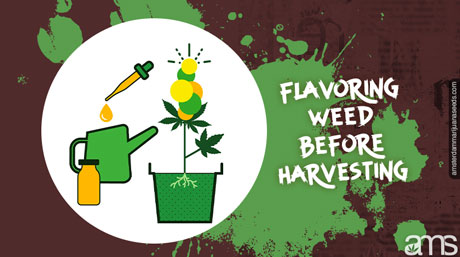
1. Flavoring weed before harvesting
If you want the strain you’ve planted to have a flavor you prefer, then you need to start preparations a few days before harvesting your weed.
According to our expert marijuana growers, preparations start 3-5 days before harvesting time. During this time, you need to stop watering your marijuana plants. Stopping this will lead the plant to extract extra mineral salts and other nutrients from the soil.
Although you can stop watering your crops for even 5 days or more before you start harvesting, you need to be very careful because that can harm your plants. They can dry up and finally die. So we recommend 3 to 5 days.
If your marijuana crops start to wither fast or show signs of wilting before the harvest day, you can add a little water to them. If you decide to do so, ensure you sprinkle the water evenly, so you’ll cover the whole plant.

When harvest day finally comes, mix extracts from your preferred food-grade or 15 milliliters of a mild solution into approximately 20 liters of clean water. The amount of clean water depends on the expected harvest. You can increase the number of liters of water if water liters if you expect
Now that your flavored mixture is ready, you should slowly and gently water it on your crops. Please be careful not to waste the solution on surface runoff.
Allow the crops to consume the solution for a few hours (roughly 3-5 hours) before you start to cut your weed.
By now, your weed has consumed water. First, they consumed the water from the soil for several weeks. Second, you had just watered them with a flavored solution a few hours before cutting them. Because of this, the weed is now moist. It would be best to spread the harvested plants evenly to avoid dampness. Ensure there is enough airflow among the crops to minimize mold formation. Keep the crops as separate as possible.
2. How to add flavor to weed during harvest
Sometimes, things may not go as planned. For example, you want to flavor your weed before harvesting, but somehow you don’t get around it. Don’t worry. You’re still in time to add flavor to your weed.
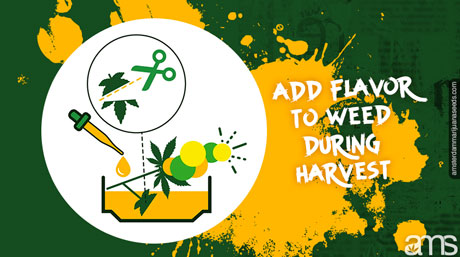
, Unlike the first step, which requires you to water the crops with a flavored mixture of 20 liters, you’ll now prepare a small amount of the solution and put it in a glass.
After this, you’ll cut a weed leaf and dip it inside the mixture. You don’t have to wait until the leaves are dry. A fresh leaf full of life is ideally the best for dipping inside the mixture contained in the glass. Why?
When the weed leaf is still alive, it has a high chance of drawing water from the glass up to the stalk and other parts of the weed.
You’ll need to allow the leaves for about seven days to settle inside the flavored water. In these seven days, the leaves will have drained all the solution from the glass.
Finally, remove the leaves from the solution, chop them to your preferred size, then dry the harvest as you usually do.
3. How to flavor weed after harvesting
Flavouring marijuana at a time when the leaves and the stalks seem to be withering and drying up seems like a hard one for many people. Nonetheless, there is nothing impossible about flavoring weed, even when it seems too late.
Even when the flowers are weak and jarred, you can still add flavor to this important crop.
The first step towards adding flavor to harvested weed is to add essential oil or extract into the jar. How do I do that?
Once you’ve identified an essential oil or any other extract you prefer, you’ll need to soak cotton balls inside that extract. The next step is to attach the cotton ball to the lid of the jar. Make sure the cotton ball does not fold anywhere. Rather, it has to hang from the lid facing down.
When you hang the cotton balls, ensure they do not stretch and touch the weed buds. You must also ensure that there’s no excessive moisture inside the jar because excessive moisture causes mold, which will result in the weed rotting.
You can also minimize the chances of your weed rotting by adding several dried items into the jar. Some dried items you can add to your jar include flower petals, apple slices, and citrus peels. Alternatively, you can add marijuana spices such as cloves, cinnamon, and rosemary.

Final thoughts
It’s awesome to flavor your marijuana; in our opinion, it’s not done often enough. People think it’s hard to do, but the opposite is true. Whether it is before you harvest, during, or even after you have harvested. Therefore, it is no longer how to flavor marijuana or how to flavor weed, but a matter of when you want to flavor your weed!
FAQ
How to make weed taste like bubblegum?
To make your weed taste sweeter, like bubblegum, mix the food-grade bubblegum extract with some water and place your freshly cut buds in the mixture for a week, dry, and cure it. Then, place the dried buds in a jar, soak a cotton ball in a bubblegum extract and attach it to the lid facing downwards. This way, you have to sweeten the weed with a bubblegum flavor.
How to make weed taste like coffee?
To make your weed taste like coffee, it’s essential to ensure that the buds are fully cured and dried. Then keep them in a jar. After that, empty a giant tea bag, and put some coffee inside. Next, place the bag containing the coffee and keep it inside the jar containing the weed. No weed flavoring spray is needed.
How to flavor homemade gummies?
To flavor, your homemade gummies, get your favorite fruit juice and boil it under medium heat for 3 minutes. This enables the gelatin to set inside better. Stir the boiled juice and gelatin, then add the sweeteners according to your preference. You can then store the flavored gummies in an airtight container and keep them in a fridge. No weed flavoring drops are needed.
How to make weed taste better from a pipe?
You can make weed taste better from a pipe by adding your favorite fruit flavoring to the water pipe. Then, for a more enhanced taste, you can add ice cubes to that fruit-flavored water but be sure to clean the pipe well after use to avoid sugar from sticking.
How to make weed taste better from a bong?
Using flavored sparkling water can make your weed taste better from a bong. Some reputable brands, such as Nestle, manufacture their sparkling water using different flavors. Depending on your chosen flavor, rest assured that the undertones are nice as you inhale.
How to flavor old weed?
The best way to flavor old weed is to begin by moisturizing it. To moisturize old weed, peel off your favorite fruit (orange or mango) and place the peel in the jar containing the weed. The two shouldn’t come into contact with each other, though. After 3 hours of coverage, that weed will absorb some flavors.
How does weed flavor?
Weed flavors depend on their terpene synthase genes. For instance, a cannabis strain with limonene terpene synthase genes produces a lemon-like flavor. Weed that contains myrcene terpene genes, on the other hand, produces an earthy flavor. Other types of flavors include fruity and minty.

Dutch police find gnome made of MDMA during drug bust

Rejected applicants sue Minnesota over marijuana social equity licensing process

4 Ways Marijuana Can Help You Have A Better Thanksgiving

Can Big Alcohol Help The Cannabis Industry

California Appeals Court Rejects Marijuana Grow Permit, Citing Federal Illegality

Expert Lighting Tips For Successful Indoor Growing Weed

Acne And CBD: Exploring Alternative Dermatological Solutions

Can I Gift Marijuana This Holiday Season?

The Best Cocktails For An Easy Festive Thanksgiving

420 Vacations: Planning the Perfect Weed Vacation

Distressed Cannabis Business Takeaways – Canna Law Blog™

United States: Alex Malyshev And Melinda Fellner Discuss The Intersection Of Tax And Cannabis In New Video Series – Part VI: Licensing (Video)

What you Need to Know

Drug Testing for Marijuana – The Joint Blog

NCIA Write About Their Equity Scholarship Program

It has been a wild news week – here’s how CBD and weed can help you relax

Cannabis, alcohol firm SNDL loses CA$372.4 million in 2022

A new April 20 cannabis contest includes a $40,000 purse

Your Go-To Source for Cannabis Logos and Designs

UArizona launches online cannabis compliance online course
Trending
-

 Cannabis News2 years ago
Cannabis News2 years agoDistressed Cannabis Business Takeaways – Canna Law Blog™
-

 One-Hit Wonders2 years ago
One-Hit Wonders2 years agoUnited States: Alex Malyshev And Melinda Fellner Discuss The Intersection Of Tax And Cannabis In New Video Series – Part VI: Licensing (Video)
-

 Cannabis 1012 years ago
Cannabis 1012 years agoWhat you Need to Know
-

 drug testing11 months ago
drug testing11 months agoDrug Testing for Marijuana – The Joint Blog
-

 Education2 years ago
Education2 years agoNCIA Write About Their Equity Scholarship Program
-

 Cannabis2 years ago
Cannabis2 years agoIt has been a wild news week – here’s how CBD and weed can help you relax
-

 Marijuana Business Daily2 years ago
Marijuana Business Daily2 years agoCannabis, alcohol firm SNDL loses CA$372.4 million in 2022
-

 California2 years ago
California2 years agoA new April 20 cannabis contest includes a $40,000 purse



